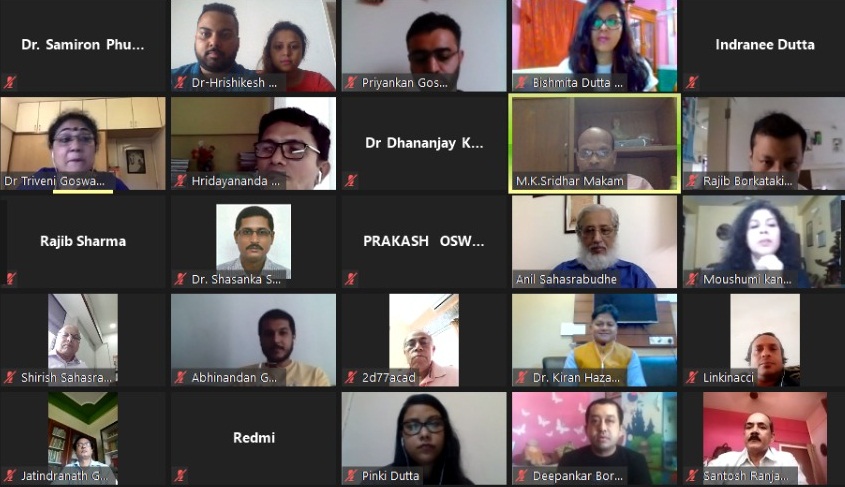Every student should acquire couple of skills besides general education: Dr Anil Sahasrabudhe

Pune, 2 August 2020: Dr Anil Sahasrabudhe, Chairman, All India Council for Technical Education (AICTE), said that every student should acquire a couple of skills besides general education to become employable and also possibly entrepreneurial and this shifting from general to vocational and vice versa should be seamless and easy.
Dr Sahasrabudhe was speaking during a national webinar on higher education to discuss “Higher Education: Preparing For A Paradigm Shift – Tools & Strategies for a new normal”. It was organised today by Asomi – the Pune based socio-cultural Assamese organization. Over 100 formal registrations were received for the webinar and finally 96 through Zoom, 565 through FB Live joined the webinar, which included the head of institutions, leading academicians, teachers, students and parents; from 20 locations across India and 3 countries abroad.
Dr Sahasrabudhe also added that the West talks only about a few different learning styles like theoretical, practical, experimental, project-based, audio-video based, ICT based etc while our ancient scriptures talk about 51 different learning styles and hence the truly inclusive model should come from India as no other country can claim as much diversity in this aspect.
On the question on implementation of NEP in backward and rural areas, Dr Anil responded by shedding light on the proposed the mentorship programme where a mentor visits the institutes and shares their experiences to help improve the country. He said that the Government is fully aware of the need to reach out to nooks and corners of the country which will be realised in the form of hard-wired fibre connectivity.
The esteemed panelists for the webinar included Dr M K Sridhar, Educationist, Member of Central Advisory Board of Education (CABE), MHRD, Dr Kiran Hazarika, Member, University Grants Commission (UGC), and Prof Shirish Sahasrabudhe, Director, Symbiosis Ishanya Centre (SICEC), ELTIS-SIFIL. Dr Triveni Goswami Mathur, Fulbright Scholar, Media & Communication Educator was the Moderator for the webinar. The event was hosted by Pune based socio-cultural Assamese non-profit organization, Asomi, under the aegis of President Dr Samiron Phukon and General Secretary Rajib Borkataki. Dr Devika Borthakur, Cultural Secretary, Asomi and Mousumi Bora, Vice-President, Asomi acted respectively as Convenor and Co-Convenor of the event.
The esteemed panelists shared their valuable insights regarding various topics such as the near-mandatory need to use technology and internet-based gadgets in the education system by teachers and students alike in the wake of the pandemic and the steps required to adjust and adapt to this paradigm shift. They also deliberated on issues such as cybersecurity and the need for the required infrastructure throughout the country, including the remote areas. Ideas were exchanged on matters relating to the use of virtual reality and audio-visual media in academia.
Dr MK Sridhar being one of the key members of the Drafting Committee of the recently announced National Education Policy (NEP) various key aspects of the new NEP was also touched upon and discussed. This is also one of the last times that AICTE and UGC are represented in a forum as two individual entities before they are merged into a single entity. The webinar also facilitated interaction between the panellists and the audience.
Meanwhile, 32 educational TV channels are providing curriculum-based content which can be accessed from anywhere in India and neighbouring countries as well. Responding to the question on the credit-based education system, the panelists mentioned that under this system, one can take courses from different institutes and universities and save in their academic bank and when minimum specified courses required by a university are done, may encash the same with a degree. The flexibility of the system was also highlighted by them wherein one will be able to combine subjects of interest from different domains such as music with electronics (engineering) and the like.
All the participants of the webinar were greatly be benefited by the plethora of thoughts and information shared through the discussion. The entire transcript of the webinar would be made available as a Reference Document by Asomi for the benefit of the various educational institutes and students and parents who will be greatly benefitted by the content.
The panelists encouraged Asomi to host another session as a follow-up to cover some more aspects of NEP and its impact on the education system in general. Asomi will announce the details for the next session shortly after checking the availability of the panelists. Asomi also offered to play an active role in implementing NEP in Maharashtra and the North East region.





